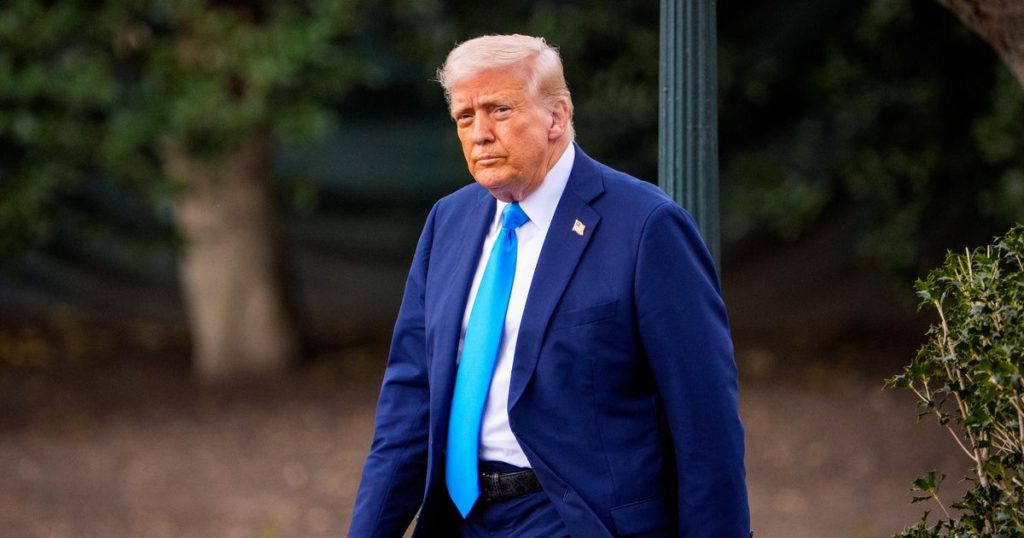In recent polling, a significant number of Americans express skepticism regarding President Trump’s handling of the economy, highlighting his focus on tariffs as a major point of contention. A collective sentiment has emerged that these tariffs, instead of aiding financial recovery, might exacerbate financial struggles by increasing prices. Meanwhile, Trump’s approval ratings remain relatively stable regarding immigration policies, a notable contrast to the dissatisfaction felt regarding his economic strategies. As Trump prepares for potentially critical upcoming elections, these revelations are vital in assessing his political capital and public perception.
| Article Subheadings |
|---|
| 1) Economic Sentiment and Skepticism |
| 2) Approval Ratings in Immigration vs. Economy |
| 3) Republican Sentiment and Trump’s Policies |
| 4) The Implications of Tariffs |
| 5) Legislative Dynamics and Future Risks |
Economic Sentiment and Skepticism
Recent surveys indicate that the American public harbors deep skepticism towards President Trump’s economic policies, contrasting sharply with the sentiments that contributed to his electoral success in 2024. Currently, only 25% of Americans feel that his measures are positively affecting their financial conditions, whereas nearly twice that percentage believes they are making things worse. This shift is substantial compared to the pre-office perception, where a striking 40% expected Trump’s policies to yield financial enhancement. The persistent concern over economic stability is highlighted by an ongoing narrative in public discourse, particularly as inflation continues to plague many households.
Approval Ratings in Immigration vs. Economy
While economic approval ratings for Trump waver, his immigration policies enjoy majority support among the public. A significant segment of his Republican base remains satisfied with his deportation strategies, which they regard as equally pivotal to their assessments of his presidency as economic performance. This divide illustrates the varying priorities among constituents, as many weigh immigration alongside, or even above, other pressing issues like the economy. The immigration approval gives Trump a degree of leverage, but it does not fully mitigate the critical views regarding his financial management.
Republican Sentiment and Trump’s Policies
The sentiment among Republicans has notably shifted over time. At the onset of his presidency, a robust 75% of Republicans believed that Trump’s policies would lead to better financial circumstances. Today, that number has dropped to below 50%. This declining confidence is part of a larger trend that reflects trepidation not only about tariffs but also the long-term implications of Trump’s policy decisions. Such perspectives may pose significant challenges for Trump as he moves forward with his 2024 re-election campaign, especially if his supporters begin to fracture on their underlying expectations of economic success.
The Implications of Tariffs
American citizens predominantly oppose the introduction of new tariffs, fearing they will directly result in hiked prices. The administration’s assertion that tariffs would yield long-term benefits does not resonate with the public, who predominantly believe that the immediate consequence will invariably be increased costs of goods. Specific concerns also arise regarding tariffs on imported vehicles, which appear particularly unpopular. Such sentiments emphasize a market apprehensive to accept protective economic measures, given that public perception predominantly associates tariffs with adverse financial effects rather than the intended economic benefits.
Legislative Dynamics and Future Risks
Political dynamics within Congress are growing fraught as Democrats increasingly call for unified opposition to Trump’s policies. Surprisingly, there is a general lack of enthusiasm even among Republicans for Trump to wield additional powers. This dynamic could bear serious implications for Trump’s political future, particularly in how his policies are assessed and possibly staggered by congressional measures. Moreover, recent discussions surrounding national security and military strategy—which have surfaced issues related to the use of private communication platforms for official matters—are exacerbating concerns about governmental transparency and responsibility. The future political landscape could enforce changes to his administration’s approach to policy and governance.
| No. | Key Points |
|---|---|
| 1 | Public skepticism regarding Trump’s economic policies has risen significantly. |
| 2 | Trump’s immigration policies continue to receive majority approval among Republicans. |
| 3 | Support among Republicans for Trump’s economic measures is notably declining. |
| 4 | Broad opposition exists against proposed tariffs, with fears of increased consumer prices. |
| 5 | Legislative pressures and calls for Democratic opposition are heightening within Congress. |
Summary
The current economic sentiment towards President Trump reflects a notable concern among Americans regarding his capabilities to enhance financial conditions through existing policies. While immigration strategies employ an element of approval, they cannot overshadow the rising disapproval rates associated with tariffs and economic management. As the political climate intensifies and elections approach, the implications of these sentiments are critical in shaping a more comprehensive viewpoint of Trump’s administration moving forward.
Frequently Asked Questions
Question: What is the current public sentiment regarding Trump’s economic policies?
Public sentiment indicates considerable skepticism towards Trump’s economic policies, with only a quarter of Americans believing that his measures are improving their financial situation.
Question: How do approval ratings vary between Trump’s economic policies and immigration policies?
Trump’s immigration policies enjoy significantly higher approval ratings compared to his economic strategies, which face growing discontent among the population.
Question: What challenges does Trump face in the upcoming political climate?
Trump faces the challenge of a declining approval among Republicans regarding his economic policies, alongside increased calls from Democrats for confrontation in Congress, which may hinder his political leverage.


